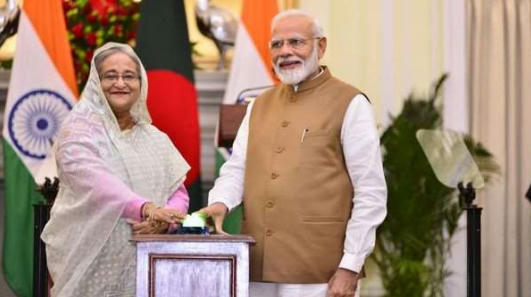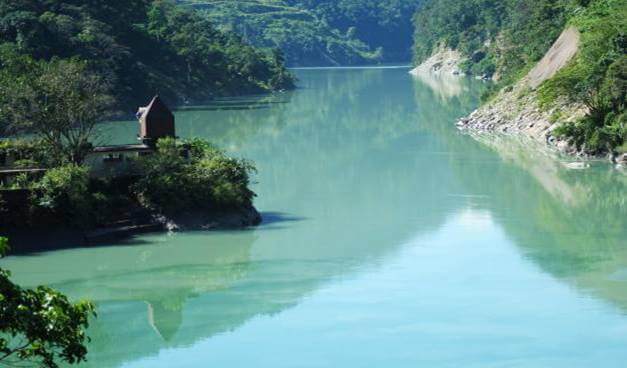
The recent India-Bangladesh meeting has been hailed as being highly successful with the signing of several major agreements and treaties. A few days later, as a reader of thirdpole.net, an article on the murder of a Dhaka student caught my eyes. He was killed for criticising the recent deals between India and Bangladesh including the treaties on water-sharing.
He took to Facebook to specifically talk about the Feni river deal which was signed by Bangladesh PM Sheikh Hasina and Indian PM Narendra Modi on October 5, 2019. This deal will also allow India to withdraw 1.82 cusecs (cubic feet per second) of water from the Feni River for usage in the state of Tripura. Feni is a transboundary river that finally flows into Bangladesh before falling into the Bay of Bengal. The purpose of this treaty is to provide drinking water to the Sabroom town of Tripura. There was another agreement that was signed between the two countries wherein the use of the Chittagong and Mongla ports would be facilitated in Bangladesh for the movement of goods to and from India.
Apart from these, there will be data and information sharing for six more transboundary rivers, namely- Manu, Muhuri, Khowai, Gumti, Dharla, and Dudhkumar. The Ganga Water-Sharing Treaty was signed in the year 1996, between PM Sheikh Hasina and the then-Indian PM HD Deve Gowda, and consisted of 12 articles and was valid for thirty years. This treaty was needed to regulate the quantum of water at the Farakka barrage as Bangladesh is a lower riparian state and was always at the receiving end of low discharge of water, especially during the dry season.
Hence, the equitable sharing of water was the need of the hour. Bangladesh also argued that the upper riparian states of India such as Uttar Pradesh, Bihar, and Madhya Pradesh have been withdrawing huge quantum of water from the Ganges, and nobody talks about it, which further only makes the position of a lower riparian state such as West Bengal hostile with neighbouring Bangladesh.

However, the success of the signing and implementation of the Teesta agreement is highly unlikely in the near future given the political tussle between the WB state government and the Central government. Teesta, which is again a transboundary river, is one of the largest rivers in North Bengal, which originates in Sikkim and covers a distance of 309 kilometres, finally joining the Brahmaputra in Bangladesh.
There are several ‘run of the river projects’ in upstream Sikkim, and having stayed in the Himalayan state for four years, I have witnessed with my own eyes as to how the discharge of the river increases and decreases because of the several dams and barrages that are present along the stretch of the river. The ecosystem of the place has been further destroyed due to deforestation, coupled with the fast-paced construction of dams and barrages. This area is again a highly active seismic zone. Let’s not forget the 2015 devastating earthquake in neighbouring Nepal that killed thousands of people.
The Atreyee River and the Mahananda River are the other two transboundary rivers that have a similar fate of getting polluted due to excessive garbage dumping, and low flow of water, even during the monsoons, causing distress among the local fishermen as they have been witnessing slow business due to poor catch along with flooding every year. This clearly portrays major mismanagement, lack of water governance and poor planning strategies leading to such dire state of rivers.
Here is a link to a short video where the river Mahananda is a being called ‘Mahaganda’:
Water And Gender roles
Water has a complex role to play along with gender relations, and it is a global phenomenon. In the Indian context, it is caste and ethnicity-ridden, and there are dedicated topics on ‘women’s water burdens’ to read about. The stories about water and women that come out of the arid and semi-arid North Indian plains are extremely appalling. For example, in the rural setup, Rajput women who are essentially upper-caste are discouraged from fetching water from the common property resources (CPRs). Women from lower-castes face more drudgery as there are high rates of migration among the male members to urban and peri-urban areas in search of better opportunities.
Due to such migration, the ‘feminisation of agriculture’ takes place forcing women to work in the fields apart from looking after the usual household affairs. On the other hand, to be able to fetch water from CPRs is also the only time for women to socialise.
Gender roles and relations are extremely important in transboundary water management. The gender roles in Northwestern India and neighbouring Pakistan is very different compared to the gender roles in eastern and Northeastern India and neighbouring Bangladesh, Bhutan, Nepal, China, and Myanmar, as both these sides of the borders have populations with a lot of diversity in terms of ethnicity, language, religion, food habits, etc. Hence the approach will have to be different.
I point out food habits mainly keeping in mind the kind of grain people consume. As for the western side, it is predominantly a wheat belt and the eastern margins are predominantly a paddy belt. Hence, for both these food crops, the water demand is very different, as a result of which the vegetation also differs greatly. For a better understanding, one has to imagine the physiography of India from west to east and how rainfall increases from west to east, which also means the incidences of floods increases as one goes from west to east.
Incidences of patriarchy, which also dominates ‘who will fetch water’, are highly visible in the rivers shared between parts of lower Assam and Bangladesh. Accordingly, the gender roles are very different in upstream Bhutan and even Arunachal Pradesh where there is a pluralistic tribal society.
As it is projected that there will be major conflicts and security issues arising out of the sharing of water, hydro-diplomacy is an important area of focus for all major countries of the world. There have been many successful treaties in the past when it comes to water sharing, for instance, the Indus Water Treaty (IWT) between India and Pakistan is one of the most successful treaties in the world. But, there have been many strenuous events in the recent past between these two countries where leaders have even talked of stopping the flow of water to downstream Pakistan, which further gives an opportunity in this quest of power to blatantly violate human rights!
As India is a South Asian ‘big brother’, it has a huge role to play in ‘water politics‘ in the subcontinent. So, delivering insensitive comments and not having empathy just makes the situation even worse. It is about time we talked more about gender roles and relations, and having a humanistic approach that protects the environment at large to help the policymakers to come up with peaceful and just policies.
